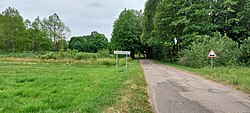Ašašninkai

Ašašninkai | |
|---|---|
Village | |
 Ašašninkai, Žirmūnų street | |
 Ašašninkai | |
| Coordinates: 53°56′10″N 24°18′10″E / 53.93611°N 24.30278°E | |
| Country | |
| Ethnographic region | Dzūkija |
| County | |
| Municipality | Varėna district municipality |
| Elderships | Marcinkonys eldership |
| Population (2021[1]) | |
| • Total | 27 |
| Time zone | UTC+2 (EET) |
| • Summer (DST) | UTC+3 (EEST) |
 | |
Ašašninkai is a village in Varėna district municipality, in Alytus County, in southeastern Lithuania. According to the 2021 census, the village has a population of 27 people.[2] In the years 1921-1945 the village was within the borders of Poland. Ašašninkai is the southernmost inhabited place is Lithuania.

Ašašninkai village is located c. 25 kilometres (16 mi) from Druskininkai, 19 kilometres (12 mi) from Marcinkonys, 1 kilometre (0.62 mi) from Kabeliai (the nearest settlement) and 1 kilometre (0.62 mi) from the Belarusian border.
Demographics
[edit]
|
| ||||||||||||||||||||||||
| Source: 1959, 1979, 1989, 2001, 2011 | |||||||||||||||||||||||||
Etymology
[edit]The name Ašašninkai (in Dzūkian Ašašnykai) comes from Lithuanian: ašašnykas < Belarusian: асочнік, Russian: осочник which mean 'a hunter beater, a forest ranger, a forest keeper, a tracker'. Before 1990 the village was officially called Kabeliai II.[3]
References
[edit]- ^ "GYVENTOJAI GYVENAMOSIOSE VIETOVĖSE". Osp.stat.gov.lt. Archived from the original (XLSX) on 7 March 2022. Retrieved 17 July 2022.
- ^ Gyventojai gyvenamosiose vietovėse: Lietuvos Respublikos 2021 metų gyventojų surašymo rezultatai (in Lithuanian). Vilnius: Department of Statistics to the Government of the Republic of Lithuania. 2021. p. 54. ISBN 978-9986-589-83-9. Archived from the original on 2022-03-07. Retrieved 2022-06-05.
- ^ Šimkus, Šarūnas (2023). Varėnos krašto vietovardžių etimologinis žodynas (in Lithuanian). Vilnius: Liutauras Leščinskas. p. 10. ISBN 978-609-447-388-3.

